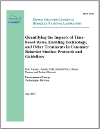Quantifying the Impacts of Time-based Rates, Enabling Technology, and Other Treatments in Consumer Behavior Studies: Protocols and Guidelines
June 30, 2013
U.S. Department of Energy
This report offers guidelines and protocols for measuring the effects of time-based rates, enabling technology, and various other treatments on customers levels and patterns of electricity usage. Although the focus is on evaluating consumer behavior studies (CBS) that involve field trials and pilots, the methods can be extended to assessing the large-scale programs that may follow. CBSs are undertaken to resolve uncertainties and ambiguities about how consumers respond to inducements to modify their electricity demand. Those inducements include price structures; feedback and information; and enabling technologies embedded in programs such as: critical peak, time-of use, real-time pricing; peak time rebate or critical peak rebate; home energy reports and in-home displays; and all manner of device controls for appliances and plug loads. Although the focus of this report is on consumer studies where the subjects are households the behavioral sciences principles discussed and many of the methods recommended apply equally to studying commercial and industrial customer electricity demand.
The report is written from the perspective of an analyst who evaluates pilots and field trials. It links choices made in the experimental design to analysis methods that are applicable to the design. In other words, the report addresses how best to ascertain whether interventions produced the intended and significant changes in electricity demand. Because experiments and pilots can be and are designed in many different ways, a wide range of methods is discussed. They share the goal of precisely measuring whether changes in electricity usage are caused by the intervention being tested. This guide serves as a starting point to help analysts decide what should be done and understand what it takes to accomplish that end. Extensive references provide the required technical details.


